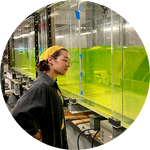About This Project
Corals Reefs are threatened by warming oceans and acidification, both of which are direct consequences of excess carbon dioxide in the ocean. Alkalinity enhancement, a method of increasing the ocean's buffer to mitigate acidification, thereby removing CO2, hits two birds with one stone. This study would investigate the impact of increased alkalinity on net calcification of corals in a controlled environment, demonstrating the potential co-benefits of this climate solution.
Ask the Scientists
Join The DiscussionWhat is the context of this research?
About 25% of annual carbon emissions are absorbed by the ocean causing declines in pH (acidification) and concentration of carbonate ions (alkalinity). This threatens marine calcifiers like crabs, oysters, and notably corals reefs. Their ability to build habitats for other organisms is reliant on available alkalinity that they can convert to a calcium carbonate skeleton. Ocean acidification is shown to slow calcification rates and studies demonstrate that the opposite is true: alkalinity enhancement increases growth. Further lab testing is needed to determine how different types of alkalinity and addition methods affect growth and resilience. If alkalinity enhancement proves to be safe on corals it can be more easily accepted as a carbon removal solution.
What is the significance of this project?
Coral reefs serve an irreplaceable function as community builders that are home to ~30% of all marine organisms. They are the most productive ecosystem in the ocean, comparable to the amazon in biodiversity. The value of these ecosystem services is about $29.8 billion per year. But these attempts to valuate reefs cannot quantify the magnitude of loss if corals went extinct, which they are projected to be by the end of the century. The causes for this loss are well documented and now conservationists need to implement solutions that mitigate further acidification and restore what has already been degraded. Alkalinity enhancement hits both targets at once and scaled globally can have significant climate and ecological impacts.
What are the goals of the project?
My goal is to understand the conditions for alkalinity enhancement that will best benefit coral growth. I will be comparing the changes in mass and photosynthesis between a test group dosed with alkalinity and a control group that is not. After three months of growth I will increase the temperature of the tanks, inducing stress and bleaching. If the test group bleaches slower than the control group, this will show that the corals enhanced by alkalinity might have a better chance surviving stress out in the wild. After understanding this baseline relationship further testing will optimize for different types of alkalinity (MgOH, CaO, Olivine), species of coral (Pacific vs Atlantic), methods of addition, and volume of alkalinity.
Budget
In the first trial of this experiment, I collaborated with masters student Riley Palmer to monitor 40-60 small coral fragments of three different Atlantic species. We used two coral tanks to stage the experiment, which require upkeep and care for the corals. Magnesium hydroxide, a lab grade form of alkalinity, was slowly introduced in daily doses to the test group. We measured the coral's growth over the span of three months measuring their mass and photosynthesis to assess growth rate. After three months we raise the temperature of the water inducing stress on the corals, causing them to bleach. This part of the experiment is valuable for understanding if alkalinity enhancement improves the corals tolerance to stress and reduces their likelihood to bleach and die.
This experiment will be executed in partnership with the University of Miami which hosts the facilities and measurement equipment to support this project.
Endorsed by
 Project Timeline
Project Timeline
The experiment will start in August 2023, the first month will be for set up and training. The first trial will run for three months, after which I will analyze the data and validate the results. The experiment is concluded with a report that shows my findings and can be shared through publication and with community partners like the Ocean Foundation, Aspen Institute, Ocean Conservancy and others. Further trials will be conducted with any additional funds.
May 15, 2023
Project Launched
Sep 04, 2023
Experimental set up
Dec 04, 2023
Conclude first trial
Jan 04, 2024
Share results
Mar 04, 2024
Publish report
Meet the Team
Laura Stieghorst
Laura is the founder of Básico, a non-profit setting the standard for transparent and responsible ocean carbon removal. She is a graduate of the University of Miami with a B.A. in Environmental Science and Policy. Her work is funded and supported by the Musk Foundation XPRIZE Carbon Removal competition, 776 Foundation fellowship, and the University of Miami Rosenstiel School for Marine Science. Her combined background as an entrepreneur and scientists fills a critical communications gap in the industry connecting key stakeholders for better solutions.
Lab Notes
Nothing posted yet.
Project Backers
- 4Backers
- 100%Funded
- $10,345Total Donations
- $2,586.25Average Donation

